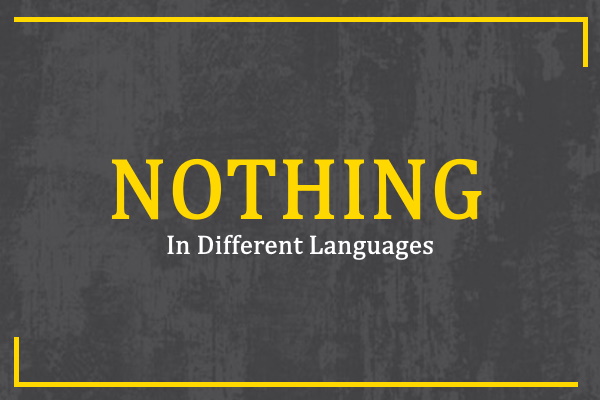Table of Contents
Nothing in Different Languages: If we analyze then even a single atom or an electron carries some importance and weight to its meaning and existence but the above heading, nothing is a pure reflection of something, what we can say, Blank.
Nothing in All Languages
Translation of word Nothing in almost 100+ different languages of the world.
| Different Languages | Word Nothing |
|---|---|
| Albanian | asgjë |
| Basque | ezer |
| Belarusian | нічога |
| Bosnian | ništa |
| Bulgarian | Нищо |
| Catalan | res |
| Croatian | ništa |
| Czech | nic |
| Danish | ikke noget |
| Dutch | niets |
| Estonian | mitte midagi |
| Finnish | ei mitään |
| French | rien |
| Galician | nada |
| German | nichts |
| Greek | τίποτα (típota) |
| Hungarian | semmi |
| Icelandic | Ekkert |
| Irish | rud ar bith |
| Italian | Niente |
| Latvian | nekas |
| Lithuanian | niekas |
| Macedonian | ништо |
| Maltese | xejn |
| Norwegian | ingenting |
| Polish | nic |
| Portuguese | nada |
| Romanian | nimic |
| Russian | ничего (nichego) |
| Serbian | ништа (nishta) |
| Slovak | nič |
| Slovenian | nič |
| Spanish | nada |
| Swedish | ingenting |
| Ukrainian | нічого (nichoho) |
| Welsh | dim byd |
| Yiddish | גאָרנישט |
| Armenian | ոչինչ |
| Azerbaijani | heç bir şey |
| Bengali | কিছু না |
| Chinese Simplified | 没有 (méiyǒu) |
| Chinese Traditional | 沒有 (méiyǒu) |
| Georgian | არაფერი |
| Gujarati | કંઇ |
| Hindi | कुछ भी तो नहीं |
| Hmong | tsis muaj dab tsi |
| Japanese | 何も |
| Kannada | ಏನೂ |
| Kazakh | ештеңе |
| Khmer | គ្មានអ្វី |
| Korean | 아무것도 (amugeosdo) |
| Lao | ບໍ່ມີຫຍັງ |
| Malayalam | ഒന്നും |
| Marathi | काही |
| Mongolian | юу ч биш |
| Myanmar (Burmese) | ဘာမြှ |
| Nepali | केही |
| Sinhala | කිසිවක් |
| Tajik | чизе |
| Tamil | எதுவும் |
| Telugu | ఏమీ |
| Thai | ไม่มีอะไร |
| Turkish | hiçbir şey değil |
| Urdu | کچھ بھی نہیں |
| Uzbek | hech nima |
| Vietnamese | không có gì |
| Arabic | لا شيئ (la shayy) |
| Hebrew | שום דבר |
| Persian | هیچ چی |
| Afrikaans | niks |
| Chichewa | kanthu |
| Hausa | kome |
| Igbo | ihe ọ bụla |
| Sesotho | ha ho letho le |
| Somali | waxba |
| Swahili | kitu |
| Yoruba | ohunkohun |
| Zulu | lutho |
| Cebuano | walay bisan unsa nga |
| Filipino | wala |
| Indonesian | tidak ada |
| Javanese | boten |
| Malagasy | na inona na inona |
| Malay | apa-apa |
| Maori | kahore |
| Esperanto | nenio |
| Haitian Creole | pa gen anyen |
| Latin | nihil |
Nothing in European Languages
Translation of word Nothing in almost 42 European languages.
| Different Languages | Word Nothing |
|---|---|
| Albanian | asgjë |
| Basque | ezer |
| Belarusian | нічога |
| Bosnian | ništa |
| Bulgarian | Нищо |
| Catalan | res |
| Corsican | nunda |
| Croatian | ništa |
| Czech | nic |
| Danish | ikke noget |
| Dutch | niets |
| Estonian | mitte midagi |
| Finnish | ei mitään |
| French | rien |
| Frisian | neat |
| Galician | nada |
| German | nichts |
| Greek | τίποτα [típota] |
| Hungarian | semmi |
| Icelandic | Ekkert |
| Irish | rud ar bith |
| Italian | Niente |
| Latvian | nekas |
| Lithuanian | niekas |
| Luxembourgish | näischt |
| Macedonian | ништо |
| Maltese | xejn |
| Norwegian | ingenting |
| Polish | nic |
| Portuguese | nada |
| Romanian | nimic |
| Russian | ничего [nichego] |
| Scots Gaelic | dad |
| Serbian | ништа [nishta] |
| Slovak | nič |
| Slovenian | nič |
| Spanish | nada |
| Swedish | ingenting |
| Tatar | бернәрсә дә |
| Ukrainian | нічого [nichoho] |
| Welsh | dim byd |
| Yiddish | גאָרנישט |
Nothing in Asian Languages
Translation of word Nothing in almost 36 Asian languages.
| Different Languages | Word Nothing |
|---|---|
| Armenian | ոչինչ |
| Azerbaijani | heç bir şey |
| Bengali | কিছু না |
| Chinese Simplified | 没有 [méiyǒu] |
| Chinese Traditional | 沒有 [méiyǒu] |
| Georgian | არაფერი |
| Gujarati | કંઇ |
| Hindi | कुछ भी तो नहीं |
| Hmong | tsis muaj dab tsi |
| Japanese | 何も |
| Kannada | ಏನೂ |
| Kazakh | ештеңе |
| Khmer | គ្មានអ្វី |
| Korean | 아무것도 [amugeosdo] |
| Kyrgyz | эч нерсе |
| Lao | ບໍ່ມີຫຍັງ |
| Malayalam | ഒന്നും |
| Marathi | काही |
| Mongolian | юу ч биш |
| Myanmar (Burmese) | ဘာမြှ |
| Nepali | केही |
| Odia | କିଛି ନୁହେଁ |
| Pashto | هیڅ نه |
| Punjabi | ਕੁਝ ਨਹੀਂ |
| Sindhi | ڪجھ به نه |
| Sinhala | කිසිවක් |
| Tajik | чизе |
| Tamil | எதுவும் |
| Telugu | ఏమీ |
| Thai | ไม่มีอะไร |
| Turkish | hiçbir şey değil |
| Turkmen | hiç zat |
| Urdu | کچھ بھی نہیں |
| Uyghur | ھېچنېمە يوق |
| Uzbek | hech nima |
| Vietnamese | không có gì |
Nothing in Middle East Languages
Translation of word Nothing in 4 middle eastern languages.
| Different Languages | Word Nothing |
|---|---|
| Arabic | لا شيئ [la shayy] |
| Hebrew | שום דבר |
| Kurdish (Kurmanji) | netişt |
| Persian | هیچ چی |
Nothing in African Languages
Translation of word Nothing in almost 13 African languages.
| Different Languages | Word Nothing |
|---|---|
| Afrikaans | niks |
| Amharic | መነም |
| Chichewa | kanthu |
| Hausa | kome |
| Igbo | ihe ọ bụla |
| Kinyarwanda | ntacyo |
| Sesotho | ha ho letho le |
| Shona | hapana |
| Somali | waxba |
| Swahili | kitu |
| Xhosa | akhonto |
| Yoruba | ohunkohun |
| Zulu | lutho |
Nothing in Austronesian Languages
Translation of word Nothing in almost 10 Austronesian languages.
| Different Languages | Word Nothing |
|---|---|
| Cebuano | walay bisan unsa nga |
| Filipino | wala |
| Hawaiian | mea ʻole |
| Indonesian | tidak ada |
| Javanese | boten |
| Malagasy | na inona na inona |
| Malay | apa-apa |
| Maori | kahore |
| Samoan | leai se mea |
| Sundanese | teu nanaon |
Nothing in Other Foreign Languages
| Different Languages | Word Nothing |
|---|---|
| Esperanto | nenio |
| Haitian Creole | pa gen anyen |
| Latin | nihil |
Video Translation of Nothing in 10 Other Languages
Coming Soon…
More Information about Nothing
Something that resembles what absence look like in a shape of word. Nothing word is a regular used word in daily lives and the word is purposeful but the action which it represents is quite off and not meaningful.
Nothing has different definitions for different set of people with different Socio economic classes like for some nothing means genuinely not having anything in their lives including basic necessities like food, cloth and shelter.
While for some nothing means not having regular meal three times a day or living in small apartment with hand to mouth income.
But for few individuals, travelling a world is nothing for them or living a luxurious life is nothing but emptiness. This proves that how the definitions differ from person to person who are in different stage and aspects of their lives.
Physiologically some believe that if someone does not have money then he has nothing, some believe that not having faith means nothing while some say not having love means nothing.
Hence the word is representing what is nonexistent and we can take example from religious facts “God created this universe from nothing” hence the word is fulfilling its purpose of something that never was there in the first place.
The word is originated from old English Nan thing which means nothing, and nothing is modern English. People used word nothing in different ways.
While in Greek its Tipota, in Spanish its Nada, in mandarin it’s Meiyou. The irony of ‘nothing’ is that the universe was created through this word and this amplifies its importance that technically it would be the first word that has some meaning ever revealed from even before the start of universe.
Nothing in different languages has many names and this word is used in many ways. Mostly used to define zero quantity.
From my perspective this word lies in only those souls which are suffering and gloming due to lack of something they desire or wish, otherwise they are blessed with everything and not nothing.
You can say nothing in other words like not a thing or nill.

Arslan Hussain, founder of The Different Languages, is an experienced translator passionate about languages and cultures. Through his website, he shares his knowledge and love for different languages, making learning accessible and enjoyable.

